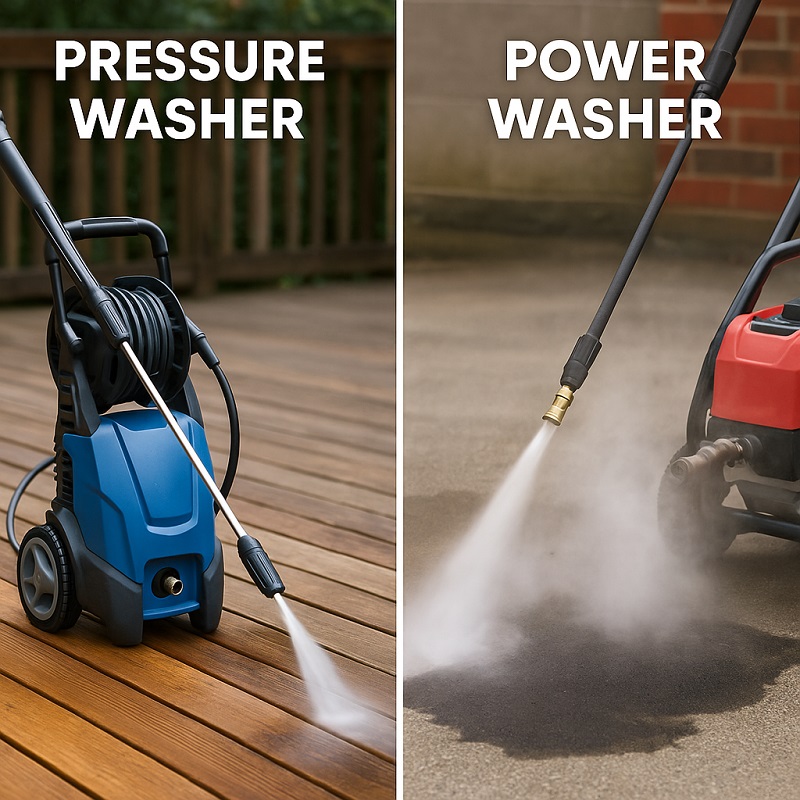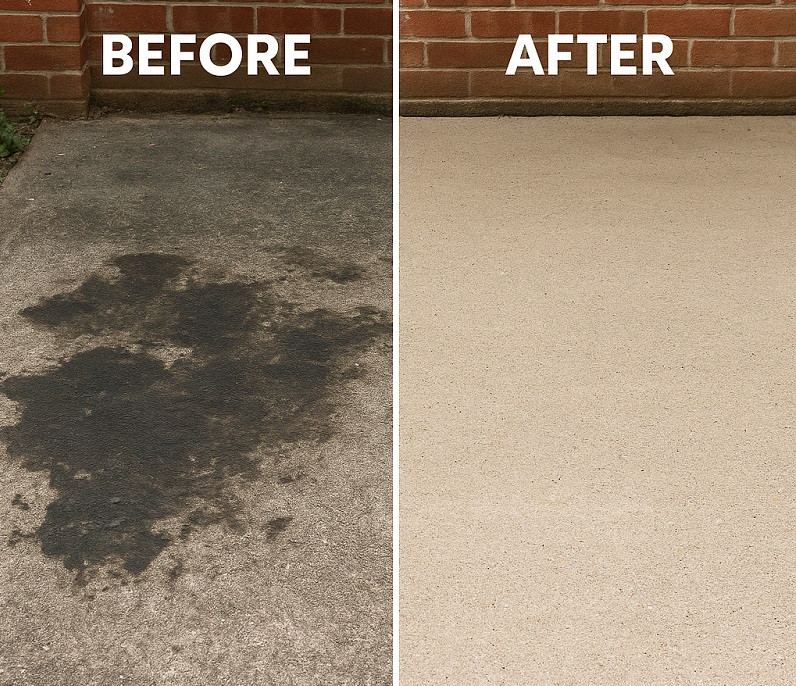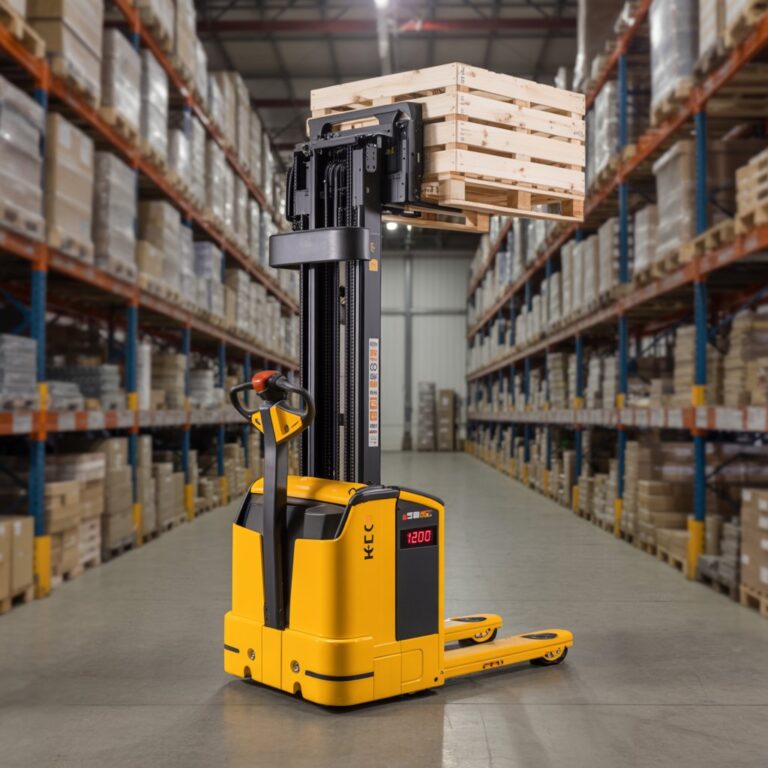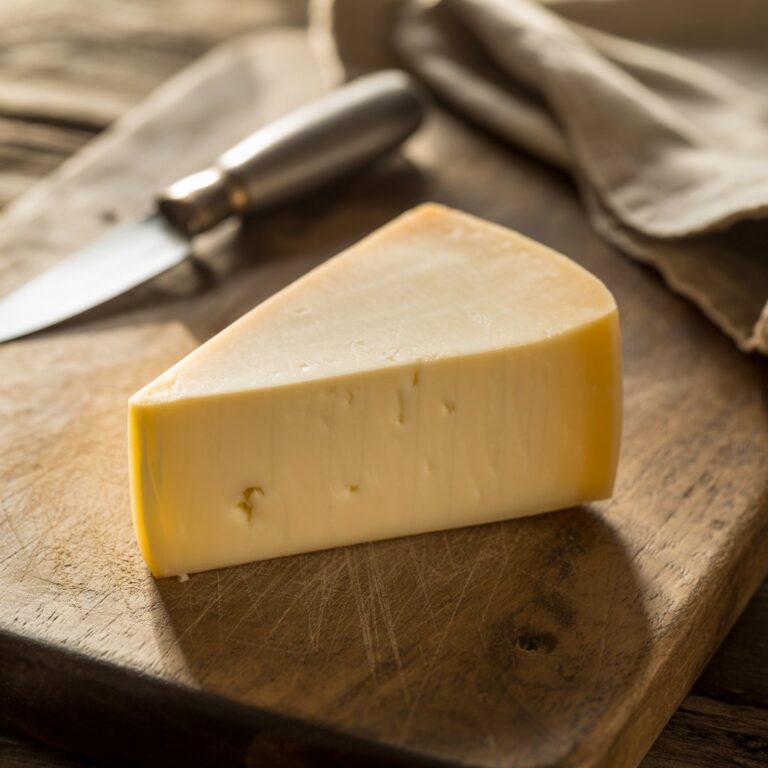At a Glance: Pressure Washers vs Power Washers
Both machines use high pressure water to clean surfaces, but power washers add heat to the water. That makes them better for greasy, grimy jobs like oil-stained driveways or industrial cleanup. For most household tasks like decks, cars, or siding, a cold-water pressure washer is more than enough.
Pressure Washers 101
A pressure washer pumps out water at high pressure (1,100–5,000 PSI) using ambient-temperature water. They can be powered by electric motors, batteries, or gas engines, and are good for general-purpose cleaning.
Common Uses:
- Cleaning decks and patios
- Washing cars and boats
- Removing dirt from sidewalks and fences
- House siding and brickwork
Pros:
- Less expensive (starting at $150)
- Lighter and easier to use
- Lower risk of surface damage
Cons:
- Not great for removing oil or heavy grime
- Cold water may require more detergent
Power Washers 101
A power washer is basically a pressure washer with a built-in heating element or burner coil that heats water to 130°F–250°F. This heat makes a big difference for oil, gum, or mildew.
Common Uses:
- Degreasing driveways or garage floors
- Sanitizing commercial kitchens
- Cleaning industrial equipment
- Removing mold or mildew from surfaces
Pros:
- Better for oily, greasy, or sticky messes
- Less detergent needed due to heated water
- Faster cleaning time for tough stains
Cons:
- Expensive (often $3,000+)
- Requires fuel for the heating system
- More maintenance
- Risk of damaging soft surfaces
Pressure Washers vs Power Washers Side-by-Side Comparison
| Feature | Pressure Washer | Power Washer | Why It Matters |
| PSI Range | 1,100–5,000 | 2,800–4,000+ | Measures cleaning force |
| Water Temp | Ambient (cold) | 130–250°F (heated) | Grease/mold needs hot water |
| Cost Range | $150–$2,000 | $3,000+ | Budget consideration |
| Best Use | DIY/Home Projects | Industrial/Heavy-duty | Matching tool to task |
| Complexity | Low maintenance | Requires burner upkeep | Total cost of ownership |
How Heat Changes the Chemistry
Hot water reduces surface tension of water allowing it to break down oils, fats and grime more effectively. In fact, hot water cleans 40% faster in oily conditions. That means less detergent and less time scrubbing.
Which One Do You Need?
- Wood deck or vinyl siding? Use a pressure washer.
- Oil on a driveway or equipment? Choose a power washer.
- Cost conscious? Pressure washers are more affordable to buy or rent.
- Cleaning often and commercially? A power washer pays off in efficiency.
Buyer’s Checklist Before You Buy or Rent
- PSI & GPM Ratings: Higher = faster cleaning (PSI x GPM = cleaning units)
- Nozzle Types: 15°, 25°, 40° for spray angle
- Power Type: Electric (quiet, light-duty), gas (powerful, noisy), battery (portable)
- Rental Costs: ~$100/day for pressure, $150+ for power washer
- Warranty/Service: Always check support options
Attachments & Accessories That Maximize Performance
- Surface Cleaners: Driveways and patios
- Foam Cannons: Cars and RVs
- Turbo Nozzles: Tough stains
- Undercarriage Washers: Auto detailing
- Extension Wands: High places
These will expand your machine’s capabilities and reduce time on tough jobs.
Commercial vs Residential Applications
- Residential: Light duty, seasonal, vehicles
- Commercial: Fleet maintenance, restaurant equipment, graffiti removal
- Construction/Industrial: Power washers used daily for heavy equipment and job site cleanup
If you’re a property manager, contractor or food business, a commercial grade power washer will pay for itself.
Common Mistakes to Avoid
- Too much PSI on softwood or car paint
- Holding nozzle too close and damaging surface
- Forgetting to purge air before starting
- Spraying under siding or roof shingles
- Not wearing protective gear (can be serious injury)
10 minute setup and knowing your machine’s limits saves you big time.
Eco-Friendly Washing Tips
- Biodegradable soap only
- Capture graywater or divert from storm drains
- Wash early in the day to reduce evaporation loss
- Switch to battery powered for emission free cleaning
Some newer models even have eco-mode to reduce water pressure and save resources.
Environmental Impact & Water Use
- 5–3.5 gallons per minute
- Power washers burn fuel and increase CO2 footprint but reduce chemical use
- Always follow EPA guidelines for outdoor cleaning
Cost Breakdown: Buy, Rent, or Hire?
| Option | Cost Estimate | Best For |
| Buy Electric | $150–$400 | Homeowners with regular small jobs |
| Buy Gas | $300–$800 | Bigger jobs and tough surfaces |
| Rent | $100–$200/day | Occasional or one-time jobs |
| Hire a Pro | $150–$400 per job | Big projects, no hassle |
Some real estate agents report a 5x ROI on curb appeal upgrades like power washing siding or driveways before selling a home.
Case Guides
Driveway Degrease (Power Washer): Heated water dissolves oil spills in minutes.
Deck Refresh (Pressure Washer): 25° nozzle and low PSI (~1,500) to clean without damaging wood.
Moldy Siding (Pressure Washer + Soap): Apply detergent first, wait 5 minutes, rinse with 40° tip.
Commercial Equipment (Power Washer): High temp melts grease on tractors, engines, dumpsters.
Top Brands & Models in 2025
- Sun Joe SPX3000 – Electric, budget friendly, 2,030 PSI
- Simpson Cleaning MSH3125 – Gas powered, 3,200 PSI, home/pro use
- Ryobi RY142300 – Brushless motor, electric, 2,300 PSI* Karcher G3000X – Hot water power washer, commercial grade
- SGS Engineering (UK) – Petrol, electric and cordless pressure washers. SGS 2,500 W (160 bar) with patio cleaner and dual detergent tanks. SGS 1,800 W (135 bar) electric. Homeowner and light contractor use. Choose based on your PSI needs, budget and usage.
FAQs
Can I convert my pressure washer into a power washer?
No. Power washers require a heating coil and burner system.
Does higher PSI mean better cleaning?
Not always. Match PSI to the surface to avoid damage.
Is hot water safe for cars or paint?
Use caution. Hot water can strip wax or damage soft paint.
Do I need detergent with hot water?
Less often, but for some jobs (like mildew) it’s still helpful.
What surfaces should I never pressure wash?
- Asphalt shingles
- Lead-painted surfaces
- Old wood with cracks
Key Takeaways
- Pressure washers are good for most home tasks.
- Power washers are best for grease, oil, and commercial cleaning.
- Consider PSI, water temperature, and surface type before choosing.
- Renting or hiring a pro might be more cost-effective for rare tasks.
- Attachments like surface cleaners and foam cannons are handy.





